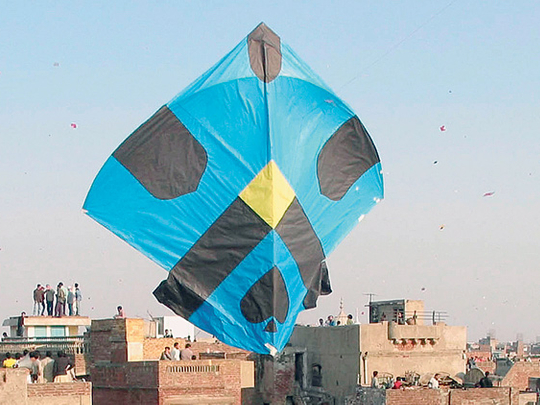
Lahore: A ban on a decades-old and colourful tradition of kite-flying has riled many Pakistanis, but authorities say the sport has killed people and encourages "immoral" celebrations.
The annual kite-flying festival of Basant, which marks the start of spring in eastern Punjab, involves aerial duels in which participants try to bring down each other's kites using string coated in a sticky paste of ground-up glass or metal.
Women dress in their most brilliant colours for what's become a major festival drawing thousands of celebrants to Lahore as well as multinational companies that rent rooftops for clients and guests.
"It's our culture," said Shoaib Mahmoud Naqeebi, a shopkeeper in Lahore. "It's an event where we share happiness with family and friends. It's fun. It's harmless."
But Pakistan's Supreme Court banned kite-flying in 2005 in response to an outcry over injuries and deaths caused every year by the glass-coated string. The court added that the ban could be lifted for a limited period if a city requests it.
But last month, the Lahore High Court turned down a request for lifting the ban.
Deaths
Every year, Pakistani media report dozens of deaths and injuries caused by the high-flying duels, mainly of children and motorcyclists whose throats are sometimes cut by the string.
For many fans in Punjab, it's an unfair decision, one that costs the city and its merchants money.
"Look at what's happening in this country," said Syed Nazim Ali, a student of business administration at Punjab University. "Everyday you hear news about blasts, suicide bombings and war. So what if I get a day or two for entertainment with my family?"
Sajjad Bhutta, the top district official for Lahore, said the government would defend the ban because the issue is not only public safety. "Immoral acts like drinking and dance parties have become part of it," he said. "You cannot raid each house so an event that spreads immorality and causes death cannot be allowed in a Islamic society."
Islamist groups also oppose kite flying, branding it a Hindu festival that promotes gambling. In the 1990s, the Afghan Taliban infamously banned kite-flying, a restriction that figured prominently in the popular novel and movie, The Kite Runner.
But the ban also affects kite merchants, the Punjab Kite-Flying Association says, causing unemployment and financial losses in the millions of rupees.
After the ban, Naqeebi said, he rented out his shop and started selling beads in the driveway of his home. "Nobody cares how difficult my life is now." Another merchant, Shahid Hussain, said his earnings had been reduced by 75 per cent from what he used to make selling kites and string.
Bhutta, the district administrator, dismissed claims of lost business. "There is no big economic impact, as people were mostly selling kites as a side business," he said.
The controversy has become political. Punjab governor Salman Taseer in mid-February announced on local television that he would celebrate Bas ant in defiance of the ban.
Lahore police also detained the kite-flying association's secretary-general Shaikh Salim on February 20 after he announced that Basant would take off on March 7.
The district government won't listen to his arguments, he said. "They don't care about us and people attached to this business," he added. "They have made up their minds."












